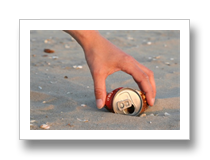As usual, Megan visited Grandma Brown in her well cared-for garden with a bunch of flowers. This may seem to be a contradiction in itself as the garden was in full bloom with bees busily collecting the pollen and the birds in the trees twittering a welcome. For Megan, this gesture was an expression that went beyond the actual handing over some creations of nature. It was the sign of their intensive love for each other, a certain understanding and caring, that went beyond ordinary relationships.
After all, Grandma Brown has a large family with lots of grandchildren who visited her regularly at her mountainside blossoming and perfumed paradise. Especially the lilac bushes, when heavily in blossom, exude their heavy and intoxicating aroma like incense in a religious celebration.
At Granny’s wrought-iron garden door, sometimes a sign was affixed with a message for the postman not to put any mail in the letterbox as it is occupied – again – by a loving family of birds that, too, wishes to pursue their tranquil family life undisturbed.
Many was the time when Megan and her family of one brother and three sisters had sat on garden benches outside the wooden home, where thick green bushes formed an alcove, secluded and in happiness! Sometimes other members of the family visited Granny, as she was very popular, and joined the cheery gathering. Percolated coffee was then enjoyed by the grown-ups and lemonade for the children was served in long cool glasses. Worries of daily life were discussed and in doing so, they seem to diminish.
Children, too, spoke freely of their school days and problems with their friends, especially Megan, who tended to sit right beside Grandma, slightly leaning against her in closeness and unison.
Megan grew into a tall and beautiful young lady with a wide smile and flashing eyes. Especially, when she visited her Grandma, who never seemed to change in appearance, except perhaps for a few more wrinkles in her friendly face. Megan always sat beside her, in unison and protection.
One day, Megan’s visit to Grandma was different. She had her usual flowers, and the same loving smile but when they sat down, she placed herself opposite her and reaching out to hold Grandma’s hands, she said these cataclysmic worlds that would change the live for both of them.
‘Nana, I have to tell you something..,…I am going overseas, to Europe, only for two years.’ Nana’s loving face betrayed nothing, so Megan continued: ‘I just want to see the world, Nana, I shall always write to you and, as I said, two years will quickly go by, Nana and I will be back with you again.’ Saying that with confidence, she pressed her grandma’s hands with extra firmness – it sounded like a solemn vow!
Grandma felt an icy grip on her heart and she felt Megan’s hands shaking despite keeping her pretty face bravely under control. Was there moisture welling up in her big brown eyes and forming a tear in a corner?
Grandma thin lips became thinner as she tried to assure Megan and, perhaps herself, ‘I’ll wait for you!’
Megan did not stay for a while, not as usual, but bid her adieu to Grandma with a warm and intensive kiss on her careworn cheek, for the last time.
‘May God protect you!’ Granny whispered.
The leaving was very difficult for Megan and this time she walked without her usual spring in her steps and swaying hips. Rather than a condemned person she dragged herself away – as if to her own execution. Why did she feel no relief for having got it ‘over with’ as she intended? She felt her heart heavy and hurting.
For her family and relations, Megan’s departure was quick – she was gone far too suddenly and an icy, empty, void seemed to be present at home and at family meetings. At the latter, there was always the inevitable question ‘How is Megan?’ or ‘Have you heard from Megan?’
It was mostly Grandma who raised the question first, but she did not betray any further emotions about her favourite grandchild. Megan’s parents shook their head dejectedly and looked downwards with a worrying frowning. But soon the subject of their conversation changed to everyday occurrences and the children in the family circles were too young to understand this situation.
Finally, a postcard arrived, by airmail and from a far- away place in Europe, in Megan’s familiar writing. She was all right was her assurance and that there was no reason to worry. Her promise was to write again very soon.
Grandma held this postcard in her hands for a long time, and with a loving look took in the hand writing of a person so dear to her. If she only could see once more the hand that wrote these lines! Despite Megan’s promise to write again soon, it took a long time before the next postcard arrived, too long and painful for everybody.
But Megan was far away and caught up in different worlds and situations. She worked hard in casual jobs, whatever she could find. Her natural friendliness and smile made her popular wherever she went.
Naturally, she was caught up in love affairs and met a family that took her in like her own daughter. Going out with new-found friends, having parties and fun, fun, fun, her young heart did not seem to notice that time was flying as it did not mean anything to her young heart.
Only sometimes, when moments stood still, her mind wandered ‘back home’. And in these moments her soul mate, her beloved Grandma appeared and her warm eyes looked into hers and her lips moved ‘I wait for you!’
Is she all right? What was she doing right now? Was she missing her?
And then in her thoughts her parents appeared, her brother and sisters, and the other members of the family who used to meet so regularly at Grandma’s. The warm feeling of cosy comfort then welled over her and she could almost feel the love they felt for each other. And the laughter and singing when uncle Paul played his guitar. They were cheerful songs she has not heard since and thinking of all this a painful longing awoke and began to tuck her heart.
Naturally, everyday worries and struggle to make ends meet became too familiar to her but her proud and determined personality did not allow her to confide to anybody.
‘How is Megan, have you heard from her?’ Back at Granny’s place these questions kept being asked, any scant information was eagerly shared and wistful sigh’s were heard.
Years were going by………..
Megan sometimes looked up at the sky – the sky in her part of the world – and noticed that it was not as blue as at home. There were more clouds, many more formations, and very little sunshine. How would it be, she thought, to be ‘back home’ sitting again in the warm circle of her family and if she could only hold her grandma’s hands once more and look into her loving face and tell her what she had been through! It would be so wonderful to let her know how much she missed her.
She did not have the money to fly back home and she was too proud to ask her parents for help. In this stalemate of suffering, she managed a brave face and tried to live an everyday life.
One day, her Grandma was no more. On her death bed, she had asked for Megan and how she was and she seemed to be praying for her.
Twenty years had gone past when Megan returned. This time with her family, a handsome husband and two lovely daughters and her first questions were for details about her Grandma. She visited her grave, cried bitterly into her cupped hands and had a long, mental, conversation to her Nana. Weeping uncontrollably, she also prayed, seemingly forever.
If she only could turn back the clock - vainly did she try to will this. And, kneeling by the graveside, she suddenly heard Nana’s familiar voice: ‘I wait for you!’













